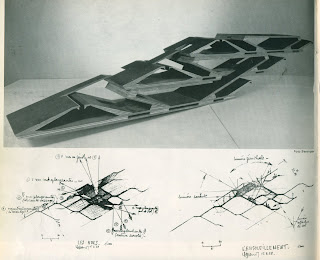During the last part of the studio we put an emphasis on program organisation, floor plan, section and oblique plans with Architecture Principe (Claude Parent and Paul Virilio), the invention of the corridor (text "Figures, Doors and Passages" by Robin Evans), the implication of field condition with the text "From Object to Field" by Stan Allen (link).
These 3 points, Oblique, Plan, Field are the key elements for re-evaluating re-programing the geometry of the interior of the House project.
The emphasis is to broaden the idea of Digital architecture to a different formal idea than the Blob. Digital architecture is not only the possible use of computer to design architecture but before that, a system of designing through analogue computers with different mode of experimentation based on a holistic understanding of systems (ecological, social, historic, symbolic...).
If for example you want to evaluate the flow of sun or wind that penetrate through your building, you need to quantify these elements, they become parameters. According to your concept, your "
parti" (social, symbolic, politic, ecological...) you can adjust these parameters.
The digital Age brought the possibility to use parametric softwares to simulate these systems, the same way that Gaudi or Frei Otto created their analogue research models or analogue computers.
Gaudi's analogue computer models were inverted structural fabrication. They allowed him to understand the stress constrains for the
Sagrada Familia.
 |
| Studio Gaudi |
 |
| Frei Otto, Stuttgart Train Station soap model |
Frei Otto founded the
Institute for Lightweight Structures at the Universityof Stuttgart where experimentation in
tensile and membrane structures were carried on. They used soap bubbles, fabric, to find minimal surfaces.
 |
| Olympic park, Munich, Frei Otto |
 |
| Szechenyi Thermal Bath, Budapest |
Szechenyi Thermal Bath is a perfect example of mix program in a very baroque fashion, surfaces and places have always more than one program, bluring boundaries between body, health, mind, relaxation and pleasure.
 |
| Sou Fujimoto |
 |
| Sou Fujimoto |
 |
| Cappadocia, troglodyte dwelling, Turkey |
 |
| Gellert Baths, Budapest, Hungary, Art Nouveau |
 |
| St Gallen Abbey church Library, Switzerland |
 |
| MVRDV |
 |
| R&Sie |
 |
| Sou Fujimoto |
Last texts are from Reyner Banham "Environmental Management" and Charles Rice "The Inside of Space: Some issues Concerning Heterogeneity, the Interior and the Weather".
These texts would focus on Digital architecture and Phenomenology, especially concerning a very recent moment in architecture with the blur building by Diller & Scofidio and Mathieu Lehanneur.
They open a possibility of creating an architecture of weather control, where implication on skin (facade), floor organisation of the environment would be combining the artificial and the natural.
For the final submission, it is required to fabricate a final model (1/100) of the floor plates and its relation to the furniture and walls. The cladding system and facade system, should be addressed as well, but we will focus mainly on the floor plan and section organisation of the project.
The other requirement are to present the series of research models displayed during the 5 last weeks of studio and a consise power point showing organisation diagrams, floor plans, sections, axonometric and perspectives.
Here are examples of architectural models putting a strong emphasis on interior, program and architectural organisation.






























No comments:
Post a Comment